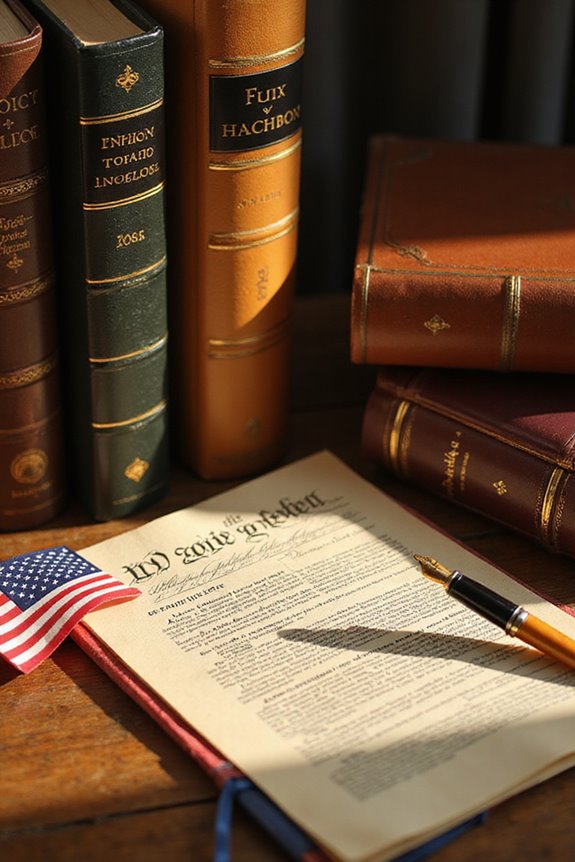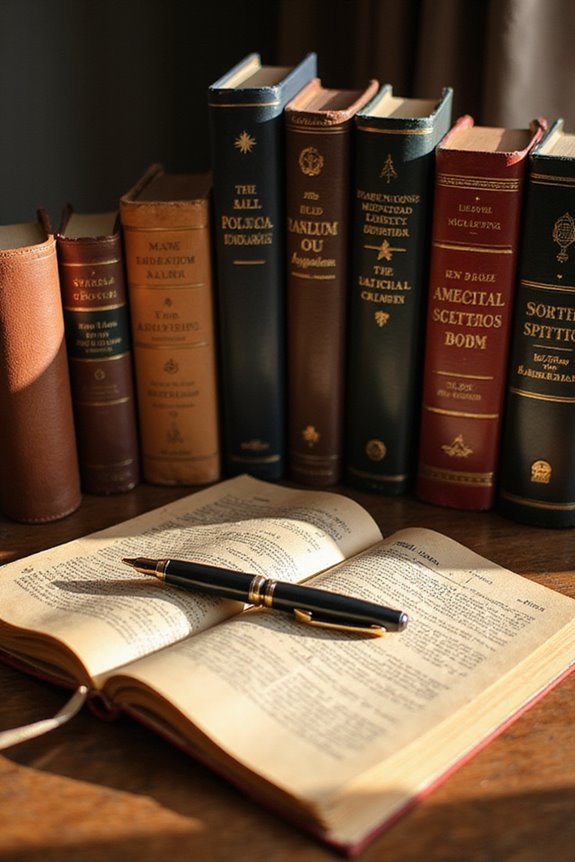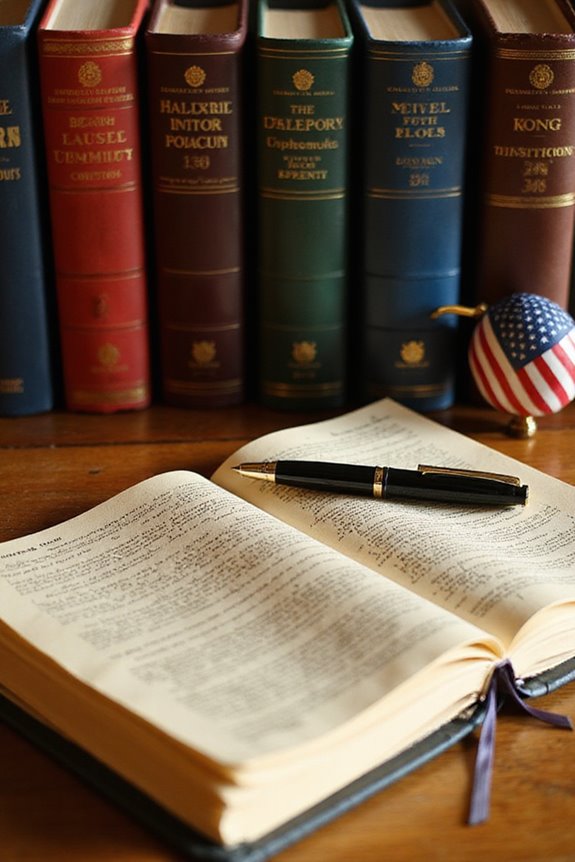Here are some of the most influential political philosophy books that have shaped our understanding:
- The Republic by Plato: Explores justice and the ideal state.
- The Prince by Machiavelli: Discusses power and pragmatic governance.
- Leviathan by Hobbes: Introduces the concept of social contract and authority.
- The Social Contract by Rousseau: Centers on political equality and community.
- A Theory of Justice by Rawls: Establishes principles for a fair society.
- Anarchy, State, and Utopia by Nozick: Advocates for individual rights within minimal state.
These works provide essential insights into the complexities of justice and governance, offering foundational knowledge in the field.
Key Takeaways
- Plato’s *The Republic* outlines justice, virtue, and the ideal state, influencing Western political thought for centuries.
- John Rawls’ *A Theory of Justice* introduces principles that prioritize fairness, equality, and social contract theory.
- Hobbes’ *Leviathan* presents the necessity of a strong sovereign for civil order, shaping modern political authority concepts.
- Machiavelli’s *The Prince* emphasizes political realism, arguing that immoral actions may be necessary for state success.
- Nozick’s *Anarchy, State, and Utopia* advocates for individual rights and a minimal state, contrasting with redistributive justice ideologies.
The Republic by Plato
Justice and Virtue: The central theme revolves around defining justice and its relationship to happiness and virtue. In *The Republic*, Plato explores the justice definition, examining how it relates to individual and societal well-being. He constructs the ideal state, *Kallipolis*, where rulers, guardians, and producers each fulfill their roles, promoting harmony and justice.
- Philosophical Rulers: Rulers possess knowledge of the Forms, especially the Good and the Just.
- Role of Education: Education shapes citizens, ensuring they understand and appreciate justice. This aligns with the concept of moral psychology as it influences political ideologies and decision-making.
- Critique of Rival Theories: Various theories are examined to establish a thorough view of justice. The dialogue emphasizes that justice must be defended for its own sake, not merely for reputation.
Ultimately, Plato’s discourse influences political thought, emphasizing that true happiness emerges from a just society grounded in virtue and reason.
The Prince by Niccolò Machiavelli

Free Will and Fortune: The interplay between a ruler’s decisions and unpredictable events shapes the success of governance. In “The Prince,” Machiavelli offers insights on Machiavellian ethics and political realism, emphasizing the importance of state security. He argues that human nature is self-interested, leading to fluctuating loyalties. To maintain control, leaders must adopt effective leadership strategies, often justifying actions through military necessity. The text explores the balance between virtue and vice, suggesting that sometimes vice is necessary for the state’s well-being. Using historical examples, Machiavelli illustrates successful governance approaches. Ultimately, “The Prince” serves as a guide for rulers, showcasing the need for cunning and strength in a turbulent political landscape. Machiavelli emphasizes that the ends justify the means, highlighting the necessity of immoral actions to achieve political success. This concept resonates with the idea of political theory that informs our understanding of governance and power dynamics in contemporary contexts.
Leviathan by Thomas Hobbes
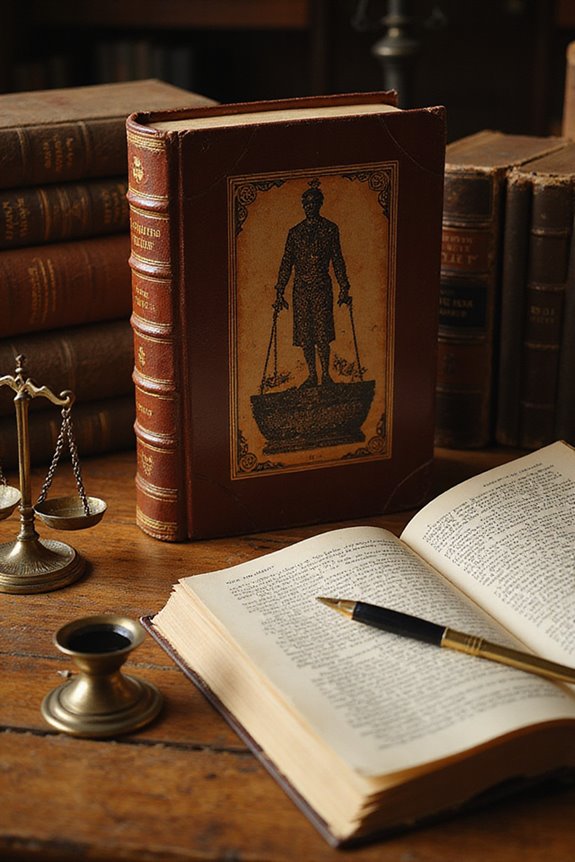
Thomas Hobbes’ “Leviathan,” published in 1651 amidst the turmoil of the English Civil War, presents a significant exploration of political philosophy that builds upon ideas introduced by Machiavelli.
- Social Contract: Hobbes argues that individuals consent to form a society for civil peace.
- State of Nature: He depicts this state as a “war of all against all,” where life is characterized as “solitary, poor, nasty, brutish, and short.” His views resonate with themes in Caste’s analysis of societal hierarchies.
- Absolute Sovereignty: Hobbes advocates for a strong, centralized political authority to maintain order.
- Human Nature: He portrays humans as inherently conflict-prone, necessitating governance forms like monarchy or democracy.
- Materialist Perspective: His philosophy is grounded in physical principles, influencing modern political thought and discussions on sovereignty and governance. Additionally, Hobbes emphasizes the importance of a commonwealth as a solution to achieve peace through the establishment of a strong sovereign authority.
“Leviathan” remains a pivotal text in understanding the foundations of political authority.
The Social Contract by Jean-Jacques Rousseau

In examining Jean-Jacques Rousseau’s “The Social Contract,” we find a foundational text in political philosophy that challenges conventional views of freedom and governance. Rousseau asserts that “Man is born free, but everywhere he is in chains,” emphasizing the need for social liberty through collective agreement. Central to his argument is the concept of the general will, which embodies sovereign authority aimed at the common good.
- The social contract requires individuals to surrender rights for mutual preservation.
- Civic participation is essential, as citizens engage in collective legislation.
- True political equality emerges when laws reflect the general will, ensuring legislative integrity. Rousseau’s ideas resonate with contemporary discussions about political equality, highlighting their ongoing relevance in today’s democratic discourse.
- Rousseau believes that a community’s moral capacity shapes its governance, allowing for a just society that prioritizes public interest over individual gain. The establishment of government is not a contract, but rather a means to execute the general will.
Das Kapital by Karl Marx
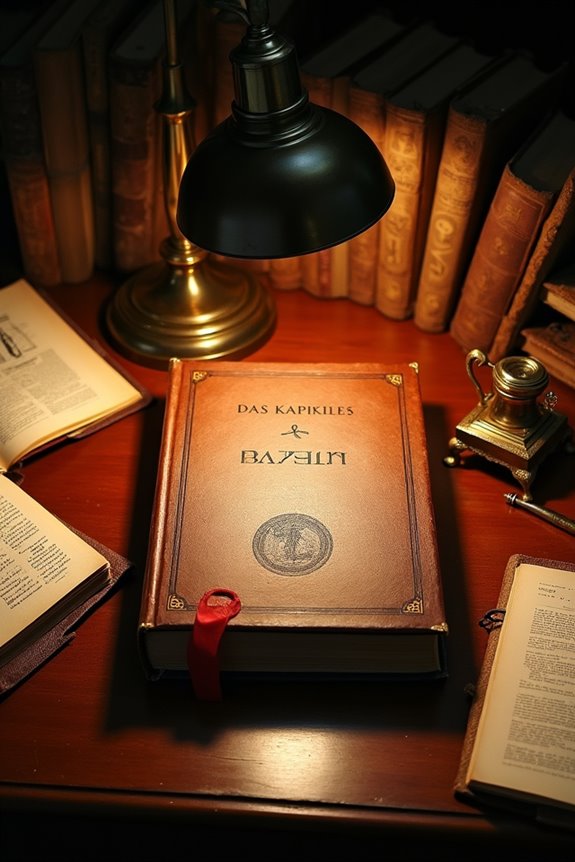
Publication History: The first volume was released in 1867, with subsequent volumes published posthumously in 1885 and 1894.
*Das Kapital* serves as a foundational text for understanding capitalism through a rigorous capitalist critique. Key themes include:
- Labor Theory of Value: Marx asserts that the value of commodities is derived from the labor invested in them.
- Surplus Value: This concept explains how capitalists profit by paying workers less than the value of their output.
- Class Divisions: Marx highlights the inequalities and class struggles inherent in capitalist societies. Political economy provides a framework for analyzing these dynamics.
- Economic Crises: The work notes that capitalism is prone to instability and recurring economic downturns. Additionally, Marx predicted capitalism’s eventual downfall due to its internal contradictions, suggesting that these contradictions drive historical change.
The Open Society and Its Enemies by Karl Popper
Defense of Liberal Democracy: Popper challenges the authoritarian nature of totalitarian regimes and underscores the importance of democratic governance. In *The Open Society and Its Enemies*, he defends the open society, emphasizing individual freedom and critical rationalism. Popper critiques historicism, the belief that history is predetermined, which fuels totalitarian ideologies. He argues for piecemeal social engineering, advocating gradual reforms rather than revolutionary upheaval. This approach allows for social change while minimizing the risk of authoritarian backlash. By promoting democratic governance, Popper highlights the need for a society that embraces fallibilism and encourages critical thought. His work serves as an essential reminder of the threats posed by closed societies and the necessity of protecting open societies against oppressive philosophies. Additionally, he emphasizes that the struggle between open and closed societies is a recurring historical theme that must be recognized and addressed.
A Theory of Justice by John Rawls
Justice as Fairness: This principle emphasizes that social arrangements should be fair to all individuals. In *A Theory of Justice*, John Rawls presents essential justice principles that form the foundation of a fair society.
- Original Position: Individuals choose principles behind a veil of ignorance, ensuring impartiality.
- Greatest Equal Liberty Principle: Everyone has equal rights to extensive basic liberties.
- Difference Principle: Inequalities are acceptable only if they benefit the least advantaged.
- Equal Opportunity Principle: Positions must be accessible to all, promoting fairness.
Rawls challenges utilitarianism, advocating for a social contract that prioritizes fairness over utility. His influential ideas continue to shape discussions on justice, equality, and policy implications in contemporary political philosophy, making *A Theory of Justice* a formidable defense of social contract tradition.
Anarchy, State, and Utopia by Robert Nozick
Three-Part Structure: The book is divided into Anarchy, State, and Utopia, outlining the natural state, the emergence of a minimal state, and the framework for voluntary associations.
- Nozick advocates for a minimal “night-watchman” state that solely protects individual rights and enforces contracts.
- He argues that from a state of nature, a legitimate minimal state can arise, focused on protection against force, theft, and fraud.
- Nozick emphasizes voluntary communities, allowing diverse societal arrangements to flourish without state coercion. Anarchy can be viewed positively as a free society that enables individuals to pursue their own interests in a non-coercive environment.
- His concept of a meta-utopia supports voluntary migrations, maximizing mutual benefits among individuals.
- By rejecting redistributive justice, Nozick highlights the importance of individual entitlement and the historical processes of rights acquisition.
This work has considerably influenced libertarian thought and political philosophy.
Frequently Asked Questions
How Can I Access These Political Philosophy Texts Online?
We can easily access political philosophy texts online through digital archives and online libraries like Project Gutenberg and Internet Archive. They offer free downloads and audiobooks, making these essential works readily available for our exploration.
What Are the Main Criticisms of These Political Philosophy Works?
What do we truly think about the criticisms summary of these works? They highlight philosophical relevance, questioning ethics, human nature, and societal structures, revealing complexities that challenge our understanding and provoke deeper reflection on political thought.
How Have These Texts Influenced Modern Political Movements?
These texts have profoundly shaped modern political movements, guiding us toward social justice and inspiring our commitment to democratic ideals. They challenge us to reflect on power dynamics and advocate for equity in our societies.
Are There Any Notable Adaptations of These Philosophical Ideas in Popular Culture?
We’ve seen fascinating philosophical adaptations in popular culture, showcasing their cultural impact. From films like “The Matrix” to songs by The Clash, these ideas resonate, provoking thought and reflection on society’s complexities and struggles.
Which Political Philosopher Had the Greatest Impact on Contemporary Politics?
We believe Hobbes, with his *Leviathan*, and Rousseau, through his *Social Contract*, profoundly shaped contemporary politics. Their ideas on authority and collective will continue to influence our understanding of governance and societal organization today.




